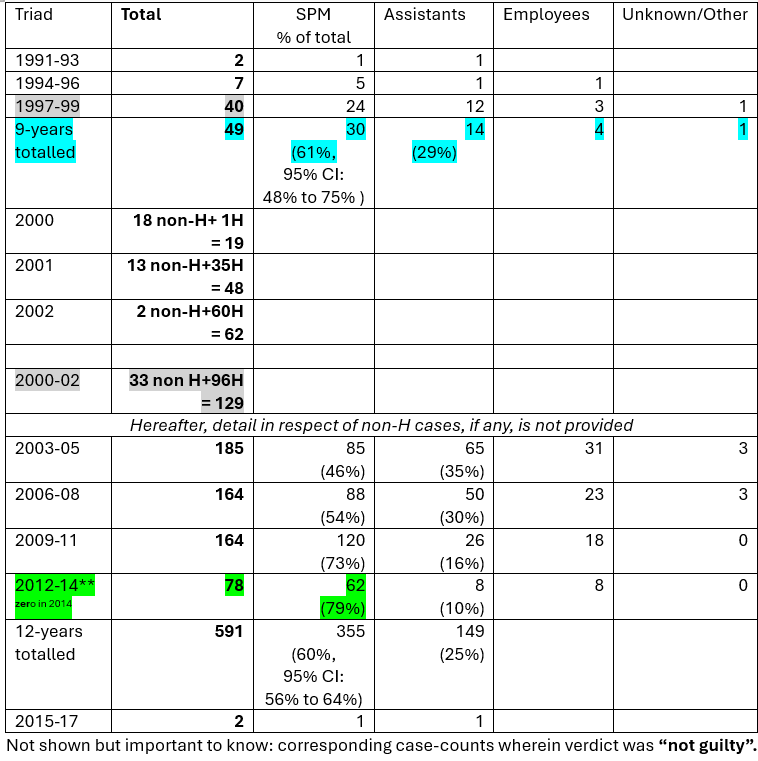The ongoing Post Office Horizon IT Inquiry is finally revealing the faults and oversights that led to one of the greatest miscarriages of justice in British history – here, unearthed data on private prosecutions and convictions shows suspicions should have been aroused much sooner.
Our investigation into Post Office prosecution data began when journalist Mark picked up on biostatistician Sheila’s paper1 on opioid-related deaths in Scotland versus England & Wales.
Through her audits of fatal accident inquiries into deaths in Scottish prison custody2, Sheila was familiar with the Crown Office and Procurator Fiscal Service (COPFS) as Scotland’s public prosecution service and death investigation authority.
Unlike in England and Wales, private prosecutions are extremely rare in Scotland and granted only under exceptional circumstances. Therefore, Post Office investigators seeking to prosecute sub-postmasters in Scotland after faulty Horizon software led to accounting shortfalls were required to present their case to the COPFS, where the decision to prosecute (or not) was taken. Accordingly, COPFS should have an auditable record of Horizon-related prosecutions taken against sub-postmasters/mistresses in Scotland. By contrast, the Crown Prosecution Service (CPS) in England and Wales likely lacked oversight of private prosecutions led by the Post Office into cases of fraud or shortfall in accounting: whether non-Horizon or Horizon-related, the latter mainly in the 21st century.
As an investigative journalist, Mark was following the Post Office Horizon Inquiry’s public hearings and deposition of witness statements more closely and incisively than Sheila was. However, Sheila had pitched to Mark that the 3-yearly time series of Post Office’s private prosecutions in England and Wales would likely signal a sharp change-point when Horizon-related prosecutions began to take off; but that accessing this time-series would likely require Sheila’s making a case to the Post Office Horizon IT Inquiry’s secretariat for them to collate the information via a Rule 9 letter, or otherwise. Meanwhile, a Freedom of Information request from Mark to the COPFS would suffice to “out” Scotland’s cases. We expected that Scotland’s cases would be a tenth only of those for England and Wales, i.e. around 50-60 cases.
We had wanted cases to be identified by the year that the trial started, as not all trials end in a guilty verdict. Mark’s information from the COPFS on 53 convictions identified by the year in which the trial started arrived first; we summarised them per 3-year epoch in the 21st century as follows: 2000-02 (11); 2003-05 (10); 2006-08 (15); 2009-11 (8); 2012-14 (9). The mean was 10.6 per 3-year epoch during the first 15 years of the 21st century.
An Inquiry nicety is that witness statements are typically published proximal to cross-examination of the witness. Mark’s incisiveness located the key data on Post Office private prosecutions for England and Wales in a Post Office executive’s witness statement. Heeding the witness’s caveats as best we could, the table below (Figure 1) summarises the information gleaned into the same 3-year epochs in the 21st century as for Scotland; and for three preceding 3-year epochs during 1991-99.
The data for England and Wales relates to convictions but we are unclear whether these are identified by the trial’s start- or end-year. We hope for consistency across epochs! The time-series for England and Wales shows more than one sharp change-point so that anyone – even a lay observer of these 3-yearly case-counts – would be likely to have questioned the stark uplifts in convictions followed by a dramatic fall in 2012-14.
Some notable change in 3-yearly case-counts, whether in the recording of them or in actual convictions, apparently occurred as early as during 1997-99.
Thereafter, a sharp, hugely statistically significant further increase occurred during 2000-02 (up from 40 in 1997-99 to 129 in 2000-02: z-score of at least 6 {ie 89/sqrt (40+129) = 89/13}.
The increase in conviction-count from 129 in 2000-02 to 185 in 2003-05 is also highly significant: z-score of at least 3 {ie 56/ sqrt (129+185) = 56/sqrt (314) = 56/ 17.72 = 3.16, p < 0.0016}. The shift down from 185 in 2003-05 to 164 in 2006-08 {likewise 2009-2011} is not statistically significant {z-score = 20/sqrt (185+165) = 21/18.57 = 1.13}.
The decrease from 164 in 2009-2011 to 78 in 2012-14 is dramatic, however, and again hugely significant: z-score of at least 5 {ie 86/sqrt(164+78) = 86/15.56 = 5.53}.

Figure 1: Analysis in 3-year epochs for England & Wales: convictions in cases where shortfall in branch accounts was at issue [SPM = sub-postmasters; H = Horizon-related]
For England and Wales, the 3-yearly mean for Horizon-related convictions during the first 15 years of the 21st century was 137.4 {ie [96+185+164+164+78]/5 = 687/5 = 137.4} from which the observed counts differed dramatically as we had anticipated.
We do not know how many investigators [Ni] the Post Office assigned Horizon-related investigations to, which led to convictions or admissions of guilt, but at most Ni claims of “you are the only one (ie: that is known to me)” were tenable.
We do not know how what percentage of Horizon-related prosecutions led to “not guilty” or “not proven” (Scotland only) verdicts; and whether the rate differed between private and CPS/COPFS prosecutions. Unless the rate was high, serious questions need to be asked about the testing of “evidence” on which convictions were secured. Private Eye has queried, as a singular miscarriage of justice3, the conviction of a sub-postmaster for murdering his wife but who has protested his innocence at three appeals thus far: and was not prosecuted for an apparent shortfall of £16,000.
However, on the face of it, this data raises two suspicions.
Firstly, that it should have been obvious within the Post Office – even with a cursory glance at the data – that there were likely one or more factors driving anomalous rates of prosecutions in England and Wales, factors that a rigorous, objective and timely investigation would have uncovered.
Secondly, that the ability of the Post Office to bring private prosecutions in England and Wales comes with a systemic lack of oversight by the police and CPS which, if present, may have detected and corrected the faults now being laid bare by the Post Office Horizon IT Inquiry.
References
- Bird, S.M. (2023) Opioid-related deaths and their counterpart by occurrence-era, age-group and co-implicated drugs: Scotland versus England and Wales. British Journal of Clinical Pharmacology, 1-20. doi.org/10.1111/bcp.15976
- Bird, S.M. (2020) Fatal accident inquiries into 83 deaths in Scottish prison custody: 2010-2013. British Journal of Psychiatry Open 2020; 6, e132, 1-7. doi.org/10.1192/bjo.2020.121
- Miscarriage of Justice. Appeal in the Post? Private Eye 2024; 1623 (10-28 May): 39.
Mark Howarth is a freelance journalist. mark.howarth101@gmail.com
Sheila M. Bird is former programme leader, MRC Biostatistics Unit, Cambridge and honorary professor at Edinburgh University’s College of Medicine & Veterinary Medicine. sheila.bird@mrc-bsu.cam.ac.uk
You might also like:




